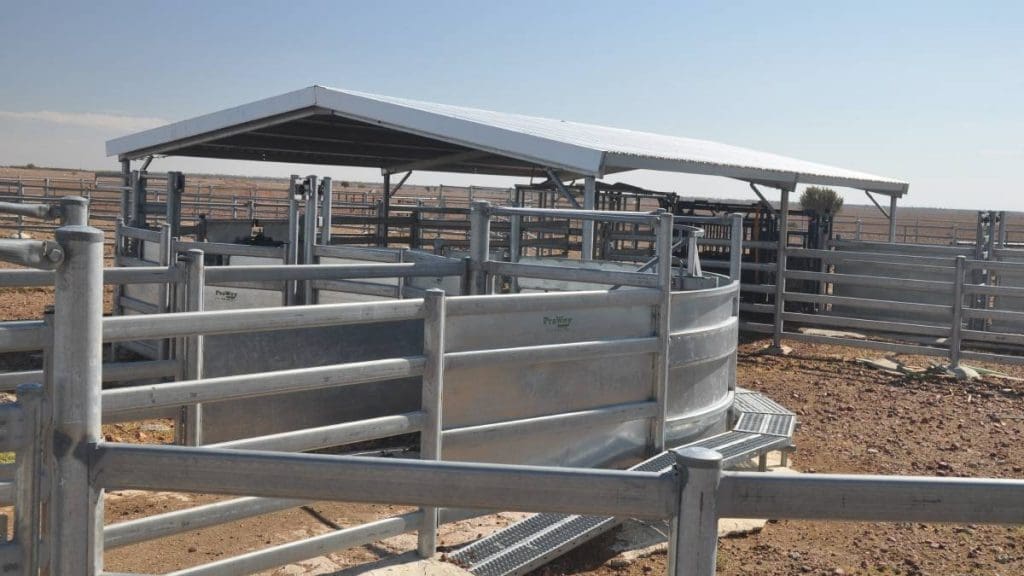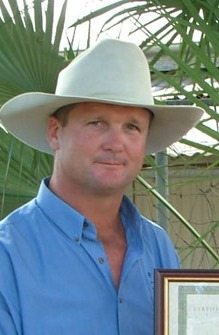Well-known large-scale western Queensland grazing property Portland Downs is under contract for purchase by the North Australian Pastoral Co, for a price of $23 million.
Covering about 100,000ha of mostly downs country between Isisford and Ilfracombe in the state’s central west, Portland has been owned and operated by Dutch company, GP Cattle for the past 13 years.
The purchase will add substantially to NAPCo’s cattle backgrounding capacity, growing out weaners from breeding properties further north, in transit to the company’s feedlot operations on the Darling Downs.
The price, bare of stock but including some plant, works out at about $230/ha.
Portland Downs is a well-improved, predominantly freehold property, with sweet gidgee, boree, whitewood and coolibah country. It has a double frontage to the Barcoo River with permanent holes, plus creeks, three flowing (capped) bores and 38 equipped dams.

One of the new sets of cattle yards on Portland Downs, constructed since conversion from sheep a decade ago.
Vendor, Dutch-backed company GP Cattle, purchased Portland in 2005, as part of a long-term plan under the direction of the late John Cox, a former Stanbroke managing director, to develop an integrated cattle breeding/backgrounding/finishing business across Queensland.
GP Cattle tried unsuccessfully to sell Portland by auction in June 2016, passing it in on an auctioneer’s bid of $10 million, bare of stock. The property was re-listed later in 2016, with a ’sweetener’ of 1500 cows and calves included.
Marketing agents at the time said offers of more than $200/ha bare (in line with comparative values in the area at the time) would be considered, but those expectations were subsequently considered ‘unrealistically low.’
Although geared to beef in recent years, Portland Downs has had a long history of successful woolgrowing, and 30 years ago produced the nation’s biggest private woolclip.
GP Cattle was owned by the Netherland-based investment company, Salentein. Founded in 1992 by Dutch businessman Mijndert Pon, Salentein had global interests in beef, grain and wine production, mostly in South America.
When it purchased Portland in 2005, Salentein also bought Cotswold, an intensive irrigated pasture and forage property on the Darling Downs.
The sale of Portland ends Salentein’s investment history in Australia, following the death of Mr Pon in 2014, which has seen the business investments dispersed.
Earlier, Portland Downs was owned by Clyde Agriculture, which bought the property in 1992 from Dalgety as mortgagee for the failed Portland Downs Pastoral Co, reportedly for between $5 million and $6 million.
Under Clyde’s ownership the property in 1997 achieved what was claimed to be the largest privately-owned woolclip Australia had seen. It sold for $1.4 million in Brisbane ($3.4m in today’s terms).
Clyde sold Portland Downs to GP Cattle after reportedly receiving an offer “too good to refuse.”
Under GP Cattle’s management, the production focus shifted from wool to cattle and the property has carried in normal seasons around 6000 breeders, and up to 8500 breeders at capacity, producing branding rates of 80 percent.
Portland was originally about 86,800 hectares when purchased from Clyde, but grew to close to 100,000ha following the purchase and aggregation of a neighbouring property.

Boyd Curran
Marketing agent Boyd Curran, from Landmark Harcourts Longreach, said he had maintained for 12 months that Portland was arguably the “best value larger-scale property in Queensland.”
“It’s a quality bit of country, and I’m really pleased that a company that I consider to be a great Australian cattle company has seen the value and the quality in the asset.”
Mr Curran said Portland had received good rain out of the recent changes that had come through, after experiencing prolonged drought conditions earlier.
He said the listing had attracted strong investor interest from a range of substantial cattle operators – both before and since recent rain, but particularly in ‘recent times.’
“We’ve had a number of genuine inspections from serious cattle and sheep producers, mostly Australian companies – even before the recent rain, who saw the quality and value in the country, even though it was drought affected,” he said.
“Central western Queensland has always been great value for money, for the quality of country on offer – both cattle and sheep country,” Mr Curran said.
Situated to the north of Isisford and about 100km south-east of Longreach, Portland is naturally sweet grazing country on predominantly red pebbly soils, rising from creek systems to rolling, shaded downs. About 7600ha of gidgee scrub has been pulled, cleared and sown, leaving generally open country covered with Mitchell and Flinders grass.
Structural improvements include four homesteads, four shearing sheds, six sets of cattle yards (two new), plus extensive shedding and quarters.
